Daily Vocabulary Words: List of Daily Used Words in Leading International Newspapers
Hi there. Welcome to this special section @ Wordpandit.
Our endeavour here is very simple: to highlight important daily vocabulary words, which you would come across in leading newspapers in the country. We have included the following newspapers in our selection:
• The New York Times
• The Washington Post
• Scientific American
• BBC
• The Guardian
• Psychology Today
• Wall Street Journal
• The Economist
We are putting in extensive work for developing your vocabulary. All you have got to do is be regular with this section and check out this post on a daily basis. This is your repository of words that are commonly used and essentially, we are posting a list of daily used words. Hence, this has significant practical application as it teaches you words that are used commonly in leading publications mentioned above.
Visit the website daily to learn words from leading international newspapers.
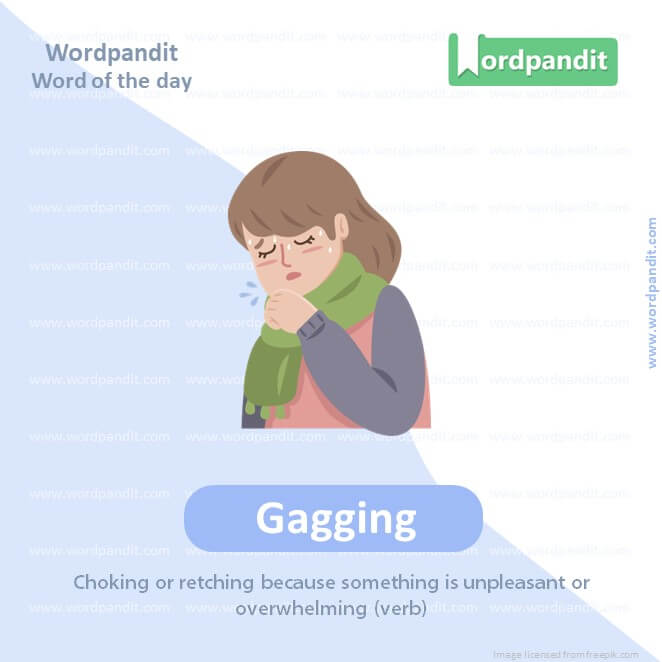
WORD-1: Gagging
CONTEXT: I have been known to be completely reasonable when the supermarket self-checkout machines refuse to let me proceed until I place my last purchased item into the bagging area.
SOURCE: New York Times
EXPLANATORY PARAGRAPH: Imagine eating something really yucky, and it makes you want to stop eating and close your mouth tightly. That’s like gagging. It’s when something feels so bad in your mouth that you can’t help but react.
MEANING: Choking or retching because something is unpleasant or overwhelming (verb).
PRONUNCIATION: GAG-ing
SYNONYMS: Choking, retching, suffocating, stifling, strangling
USAGE EXAMPLES:
1. The strong smell of the garbage had him gagging.
2. She started gagging when she tasted the bitter medicine.
3. The comedian’s joke had the audience gagging with laughter.
4. The sight of the rotting food had everyone in the room gagging.
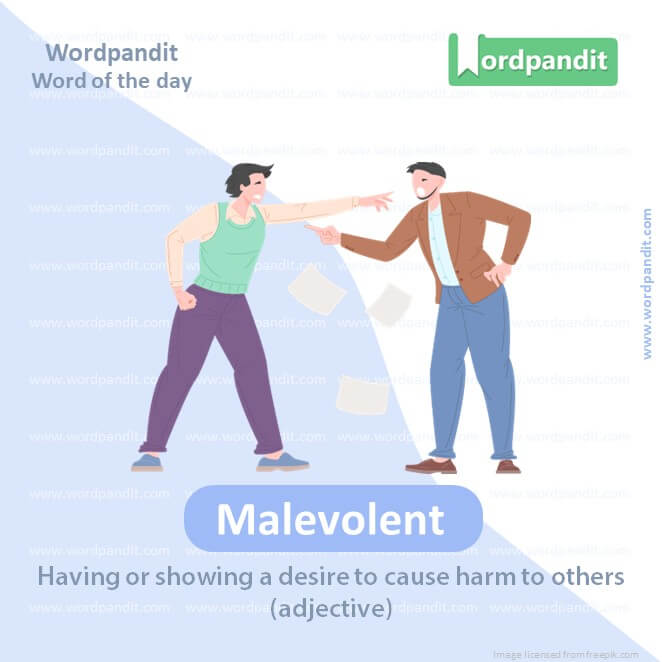
WORD-2: Malevolent
CONTEXT: the situation has become so bad that it’s brought to mind this possibility of a malevolent presence — Beelzebub, Lucifer, the Dark Lord, whatever you want to call him.
SOURCE: New York Times
EXPLANATORY PARAGRAPH: When someone is being very mean on purpose and wants to harm others, they are being malevolent. It’s like when a character in a story is trying to do bad things to the hero or heroine.
MEANING: Having or showing a desire to cause harm to others
(adjective)
PRONUNCIATION: muh-LEV-uh-luhnt
SYNONYMS: Malicious, wicked, evil, spiteful, vindictive
USAGE EXAMPLES:
1. The villain in the movie had a malevolent smile as he plotted his evil deeds.
2. Her malevolent actions towards her coworkers led to conflicts in the office.
3. The dictator’s rule was characterized by his malevolent intentions towards dissenters.
4. The malevolent spirit haunted the old mansion, causing fear among the locals.
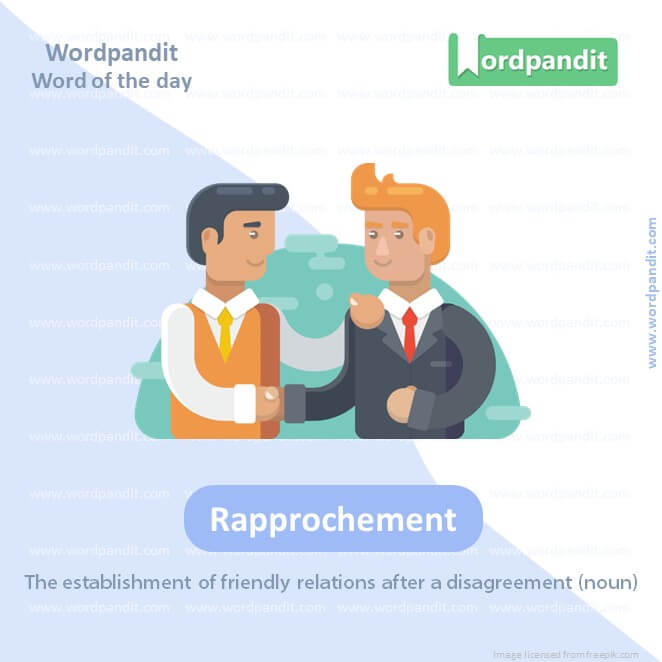
WORD-3: Rapprochement
CONTEXT: I rubbed the earbuds against my phone in a seductive circular manner that I thought might foster a rapprochement.
SOURCE: New York Times
EXPLANATORY PARAGRAPH: Sometimes when two people or groups have been fighting or not talking to each other, they decide to make peace and become friends again. This is called rapprochement, like when enemies become friends once more.
MEANING: The establishment of friendly relations after a disagreement (noun).
PRONUNCIATION: ruh-PROHSH-mahn
SYNONYMS: Reconciliation, reunion, conciliation, harmony, accord
USAGE EXAMPLES:
1. The rapprochement between the two countries led to increased trade and cooperation.
2. After years of conflict, there was finally a rapprochement between the feuding families.
3. The therapy sessions aimed at achieving rapprochement between the estranged siblings.
4. The rapprochement between the union and management improved working conditions for employees.
WORD-4: Grazed
CONTEXT: I put them in my ears and grazed the phone against my cheeks with a pressure that was amorous and gentle, but also firm.
SOURCE: New York Times
EXPLANATORY PARAGRAPH: Imagine when you accidentally touch something rough or scratchy, like a thorn or a rough surface, and it just lightly touches your skin without hurting you. That’s called being grazed.
MEANING: To touch or scrape lightly in passing (verb).
PRONUNCIATION: grayzd
SYNONYMS: Brush, skim, touch, rub, scrape
USAGE EXAMPLES:
1. The bird grazed the surface of the water as it flew low.
2. She felt a hand grazing her arm as she walked through the crowded market.
3. The car grazed the tree but didn’t sustain any damage.
4. His bullet grazed my shoulder, leaving a shallow cut.
WORD-5: Amorous
CONTEXT: I put them in my ears and grazed the phone against my cheeks with a pressure that was amorous and gentle, but also firm.
SOURCE: New York Times
EXPLANATORY PARAGRAPH: When people really like each other in a special way, like mommies and daddies do, and they show it by being very affectionate and loving, they are being amorous. It’s like when you see characters in a love story being very cuddly and sweet to each other.
MEANING: Showing or expressing love or sexual desire (adjective).
PRONUNCIATION: AM-uh-rus
SYNONYMS: Romantic, affectionate, loving, passionate, ardent
USAGE EXAMPLES:
1. The couple shared amorous glances during their romantic dinner.
2. His amorous gestures towards her were met with a shy smile.
3. The novel described their amorous affair in great detail.
4. The film portrayed the characters’ amorous relationship with sensitivity.
WORD-6: Obstinacy
CONTEXT: People talk a lot about artificial intelligence but not enough about artificial obstinacy.
SOURCE: New York Times
EXPLANATORY PARAGRAPH: Sometimes when we want to do something our way and don’t want to listen to others, we can be called obstinate. It’s like when you really want to play with your favorite toy and don’t want to share it with anyone.
MEANING: Stubbornness or refusal to change one’s opinion or course of action (noun).
PRONUNCIATION: OB-stuh-nuh-see
SYNONYMS: Stubbornness, inflexibility, rigidity, pigheadedness, intransigence
USAGE EXAMPLES:
1. Her obstinacy made it difficult to convince her to try new foods.
2. Despite his parents’ advice, his obstinacy led him to pursue a risky career.
3. The negotiations stalled due to the obstinacy of both parties.
4. His obstinacy in sticking to outdated methods cost the company dearly.
WORD-7: Gravitated
CONTEXT: Kennedy attracts many of the same sort of alienated political eccentrics who in the past have gravitated to Trump.
SOURCE: New York Times
EXPLANATORY PARAGRAPH: Sometimes when we really like something or someone, we are drawn towards it or them. This is like when you see a yummy dessert and you want to go and taste it; you’re gravitating towards it.
MEANING: To move towards or be attracted to something or someone (verb).
PRONUNCIATION: GRAV-i-tayt-ed
SYNONYMS: Attracted, drawn, pulled, inclined, moved
USAGE EXAMPLES:
1. She always gravitated towards creative people because she enjoyed their company.
2. The students gravitated towards the new teacher because of her engaging teaching style.
3. He naturally gravitated towards sports because of his love for physical activity.
4. The company’s culture gravitated towards innovation and risk-taking.
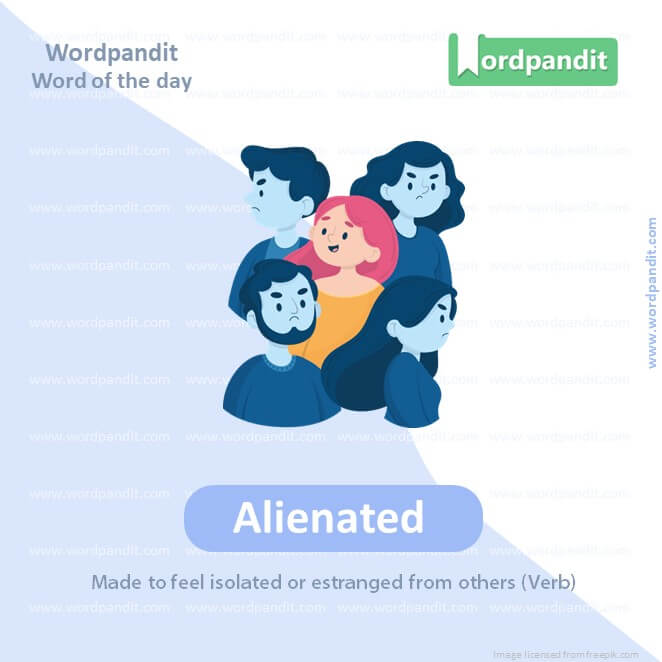
WORD-8: Alienated
CONTEXT: Kennedy attracts many of the same sort of alienated political eccentrics who in the past have gravitated to Trump.
SOURCE: New York Times
EXPLANATORY PARAGRAPH: When we feel like we don’t belong or are not part of a group or a place, we can feel alienated. It’s like when you’re at a party where everyone knows each other, but you don’t know anyone, and you feel a bit left out.
MEANING: Made to feel isolated or estranged from others (Verb)
PRONUNCIATION: AY-lee-uh-ney-tid
SYNONYMS: Isolated, estranged, disconnected, separated, excluded
USAGE EXAMPLES:
1. His rude behavior alienated him from his colleagues.
2. The new rules alienated many long-time customers.
3. She felt alienated in the new school until she made some friends.
4. The changes in management policies alienated employees, leading to low morale.
WORD-9: Disengaged
CONTEXT: Anecdotes aren’t the same thing as data, and people who go to rallies and volunteer for campaigns aren’t necessarily representative of the electorate, which is full of people who are much more disengaged.
SOURCE: New York Times
EXPLANATORY PARAGRAPH: When we are not paying attention or not involved in something, we can be called disengaged. It’s like when you’re playing with your toys, but your mind is somewhere else, thinking about something different.
MEANING: To detach or withdraw from involvement in something (verb).
PRONUNCIATION: dis-en-GEYJD
SYNONYMS: Detached, withdrawn, uninvolved, indifferent, aloof
USAGE EXAMPLES:
1. She seemed disengaged during the meeting, not contributing to the discussion.
2. His disengaged attitude towards his studies worried his parents.
3. The employee was disengaged from the project, leading to delays.
4. The disengaged expression on his face suggested he was lost in thought.
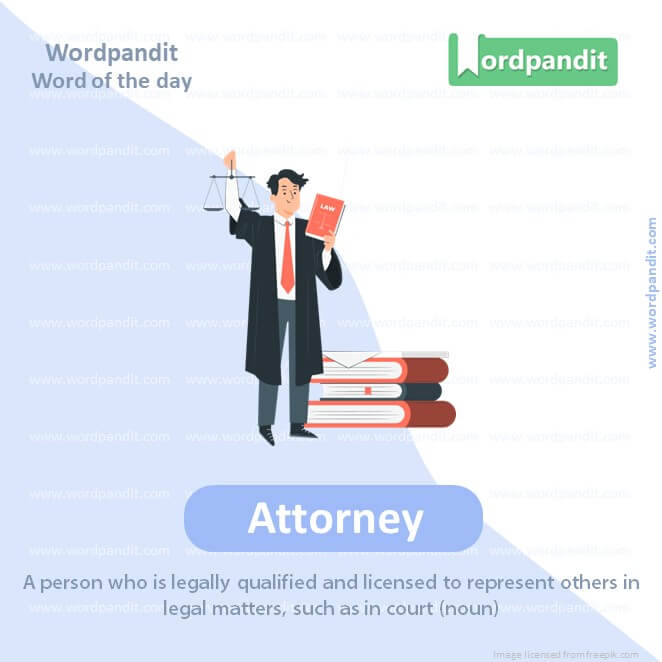
WORD-10: Attorney
CONTEXT: Kennedy’s uncle John F. Kennedy was president and his father, Robert F. Kennedy, served as attorney general.
SOURCE: New York Times
EXPLANATORY PARAGRAPH: An attorney is someone who helps people with legal things, like when grown-ups need to talk to a judge or solve problems related to rules. It’s like having a smart and knowledgeable friend who knows a lot about rules and laws.
MEANING: A person who is legally qualified and licensed to represent others in legal matters, such as in court (noun).
PRONUNCIATION: uh-TUR-nee
SYNONYMS: Lawyer, counsel, advocate, legal advisor, solicitor
USAGE EXAMPLES:
1. The attorney presented a strong case in court.
2. She hired an attorney to help with her business contracts.
3. The attorney advised his client on legal options for the dispute.
4. The defense attorney cross-examined the witness during the trial.
Vocabulary List English
In the vibrant marketplace of language learning, a ‘vocabulary list English’ is akin to a beautifully stocked grocery list – a tool that equips learners with basic ingredients necessary for fluent communication. However, absorbing the ‘vocabulary list English’ proficiently requires more than mere memorization; it calls for an informed and strategic method of learning.
The initial step towards mastering ‘vocabulary list English’ involves adopting an interactive approach. Instead of just reading and revising, use flashcards or digital memory tools to make the process more engaging. Such modes of learning not only retain interest but also boost retention and comprehension.
When learning ‘vocabulary list English’, practice is a fundamental element. Use these words in routine conversations, emails, or social media posts. The more frequently you use the words, the swiftly their usage becomes second nature.
A crucial part of understanding ‘vocabulary list English’ lies in knowing the context. Simply knowing a word’s meaning isn’t enough; you must know how it’s used in different situations. Reading a variety of materials, from fiction and newspapers to blogs and digital content, offers insight into the practical application of these words, deepening your understanding.
Furthermore, it’s vital to frequently revise ‘vocabulary list English’. Call back to what you’ve learned and give it another run-through. This habit strengthens memory retention and enhances the likelihood of the words being accessible when needed.
In conclusion, mastering ‘vocabulary list English’ is achieved through a blend of engaging tools, active practice, contextual understanding, and regular revision. These strategies, combined, can make the task of mastering ‘vocabulary list English’ a less overwhelming and more rewarding journey. As you venture into this process, you grow and expand your English vocabulary, achieving a heightened level of fluency and confidence in your English communication abilities.










